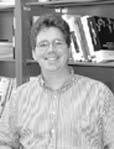
Dr. Fosler-Lussier's project, "Breaking the Phonetic Code: Novel Acoustic-Lexical Modeling Techniques for Robust Automatic Speech Recognition," strives to establish a consistent framework that seeks to cope with the conditions that give rise to unacceptable error rates in Automatic Speech Recognition. The primary challenges addressed in this project are modeling different types of variability that arise from spontaneous speech, accented speech and speech in noise. The novel approach to phonetic variability investigated here views the problem as one of phonetic information underspecification: some subset of information that the listener receives will be missing or uncertain. The key to breaking the phonetic code is understanding how, in the absence of particular phonetic cues, one can still perceive language, and how this information can influence statistical models for machine recognition of speech. It's a lot l_ke f_ll_ng in th_ bl_nks -- a task that is easy for humans but not for computers.
Eric Fosler-Lussier joined the CSE department as an assistant professor in 2003,and currently holds a courtesy appointment in the department of Linguistics. His interest in computational linguistics started early in his undergraduate career; in 1993 he received a B.A.S. in Computer and Cognitive Science and a B.A. in Linguistics from the University of Pennsylvania. In graduate school, he focused his attention on spoken language processing: he received his Ph.D. in 1999 from the University of California, Berkeley. His Ph.D. research was conducted at the International Computer Science Institute, where he was also a postdoctoral researcher through 2000. From 2000-2002 he was a Member of Technical Staff in the Dialogue Systems Research Department at Bell Labs, Lucent Technologies, and before coming to OSU, he was a Visiting Researcher in the Department of Electrical Engineering, Columbia University. He is a senior member of the IEEE, and currently serves on the IEEE Signal Processing Society Speech and Language Technical Committee, as well as the executive committee of the Association for Computational Linguistcs Special Interest Group in Morphology and Phonology.
The CAREER is the NSF's most prestigious award for junior faculty members. Established in 1995, the CAREER program aims at recognizing and supporting the early career-development activities of those teacher-scholars who are most likely to become the academic leaders of the 21st century. CAREER winners are selected on the basis of creative, career-development plans that effectively integrate research and education within the context of the mission of their institution.